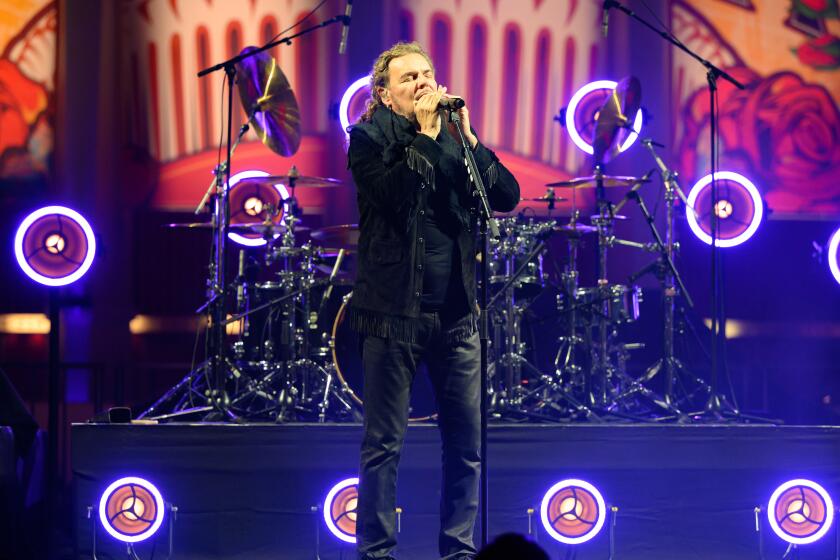On ‘Motomami,’ Rosalía scrambles cultural codes and remakes pop in her own boundless image

- Share via
You get a good sense of what Rosalía is up to across her dazzling new album from “Hentai,” a hushed and aching ballad — at least that’s what it starts out as — that comes about a third of the way through the 16-track “Motomami.”
Singing in a high, trilling voice that conjures memories of Edith Piaf, the 29-year-old Spanish pop phenom traces a shapely ascending vocal melody over gently ringing piano chords; eventually, a swooning string arrangement flickers to life behind her, lending the song a sort of wistful classic-Hollywood flavor.
Yet the title of “Hentai” refers to a very different type of filmmaking — specifically, porn in Japan’s brightly colored anime tradition — while the song’s lyric describes physical pleasure more vividly than these delicate sounds have trained us to expect: “I wanna ride you like I ride my bike,” she sings in Spanish before complimenting a part of her lover’s anatomy by imagining it “has a diamond on the tip.”
Just then a juddering drum-machine beat drills into the production from out of nowhere, blasting away “Hentai’s” sense of sophisticated calm though not, crucially, its air of emotional longing. It’s not a bait-and-switch, this song; instead, Rosalía’s idea seems to be that sex — even (or especially) at its hungriest — is worthy of the high-flown treatment that pop music typically reserves for romance.

“I whipped it until it got stiff,” she sings sweetly, drums jackhammering around her as she lays out her priorities in life: “In second place, f—ing you / In first place, God.”
Recorded around the world (including in Los Angeles, Barcelona and the Dominican Republic) and featuring collaborations with the Weeknd, Pharrell Williams, Q-Tip, James Blake, her longtime studio partner El Guincho and the trailblazing Puerto Rican producer Tainy, “Motomami” is all about rethinking established cultural boundaries; the LP, Rosalía’s third, brandishes moments of rupture, discord and collision to evoke a modern world that questions — yet still seeks comfort in — old folkways.

Again and again in these gleaming, ice-pick-sharp songs, which blend reggaeton, hip-hop, bachata, R&B and jazz (to name just a few of the styles at her fingertips), she makes improbable connections with little worry over whether the seams are showing; indeed, the seams may be the point of her work in an era when assimilation has lost its luster as a social ideal.
“I contradict myself / I transform,” she sings in Spanish over a buzzing bass line in the album’s punky opener, “Saoko.” “I’m everything.”
As Maná prepares for the first of its eight shows at the Forum, the band’s Fher Olvera and Sergio Vallín tell The Times how L.A.’s Latino community inspires them.
Rosalía broke out in 2018 with the Grammy-winning “El Mal Querer,” which remade flamenco music using electronic textures alongside the form’s ancient tools of acoustic guitar and hand percussion. In the years following the album’s release, she played Coachella and palled around with Kylie Jenner; she appeared in Cardi B and Megan Thee Stallion’s “WAP” video and recorded songs with J Balvin, Billie Eilish and Travis Scott.
“Motomami” charts that speedy ascent to pop stardom, and not always with the giggling enthusiasm Rosalía displays in her frequent TikTok videos. In the dramatic “La Fama,” she characterizes fame as “a lousy lover” and a “backstabber who comes as easy as she goes”; “Bulerías,” the only track here rooted explicitly in flamenco, recounts the hard work behind the glamour of celebrity: “To keep standing on my feet,” she sings, “I killed myself 24/7.”

Being separated from her family during the isolation of the pandemic made the journey even more disorienting. Amid the mournful organ tones of “G3 N15,” she addresses a young relative whose eye color she can’t remember and another whose interests — “races or space ships or sailboats” — have grown fuzzy in her mind. It’s a heartbreaking confession made only more poignant by her inclusion of a voice message from her grandmother musing about the importance of family.
But if fame has taken a toll on Rosalía’s personal life, success has clearly been an artistic boon. “Motomami” practically throbs with the freedom of someone flush with creative capital; its stylistic sprawl shares something with Beyoncé’s “Lemonade,” while the album’s mix of harsh noise and sculpted pop melody can recall the music M.I.A. made after “Paper Planes” became a left-field hit in the late 2000s.
In the hypnotic “Candy,” about a breakup with a guy who “broke me but just a little bit,” she threads a sample from a Burial song (which itself samples a track by Ray J) through a clattering reggaeton beat. “Chicken Teriyaki” deploys a playground-style chant as she brags about shopping for “a chain that’ll break the bank like Naomi in the ’90s.” The title cut, with a springy beat obviously shaped in part by Pharrell, is 61 seconds of pure cool-kid swagger; “Cuuuuuuuuuute” reaches toward hyperpop with a wild spray of machine-gun percussion.
“Hentai” isn’t the album’s only vocal showcase. Rosalía also sings the stuffing out of “Delirio de Grandeza,” a cover of a vintage Cuban bolero that she tricks out — hey, why not? — with a scratchy Soulja Boy sample. And then there’s the stripped-down closer, “Sakura,” in which she imagines herself at 80, looking back with a laugh at her days as a pop idol.

Not unlike M.I.A., to whom she gives a shout-out in “Bulerías,” Rosalía has taken heat for how blithely she mixes and matches genres and traditions; the renown she’s received as a European woman embracing reggaeton has particularly galled some observers. Yet even flamenco was a found art for the singer, who’s said she wasn’t exposed to the treasured Spanish form until a friend hipped her to it when she was 13, after which she embarked on an intensive decade-long study.
Does “Motomami” reveal her attentiveness to a storied Latin American sound that’s exploded in worldwide popularity since “El Mal Querer”? Of course. But what comes through no less powerfully is her love of reggaeton, two of whose pioneers — Plan B and Tego Calderón — she name-checks on an album suffused with reggaeton’s street-level spirit. (Among the many other proper nouns dropped by this artist who’s never been reluctant to name her inspirations: Kim Kardashian, Lil’ Kim, Mike Dean, Dapper Dan, Willie Colón, Carla Bruni and, uh, Apple CEO Tim Cook.)
Rosalía is also an exceptionally shrewd record-maker: To do her version of bachata, the beloved Dominican style, in “La Fama,” she didn’t recruit a proven bachata singer but rather the Weeknd, whose light, imploring voice turns out to be perfect for the song — and whose megastardom helped guarantee a massive audience for her latest cultural mash-up.
Some will view her strategy as pretty rich in a song about fame’s soul-depleting properties. Rosalía is OK with the paradox.
More to Read
The biggest entertainment stories
Get our big stories about Hollywood, film, television, music, arts, culture and more right in your inbox as soon as they publish.
You may occasionally receive promotional content from the Los Angeles Times.












